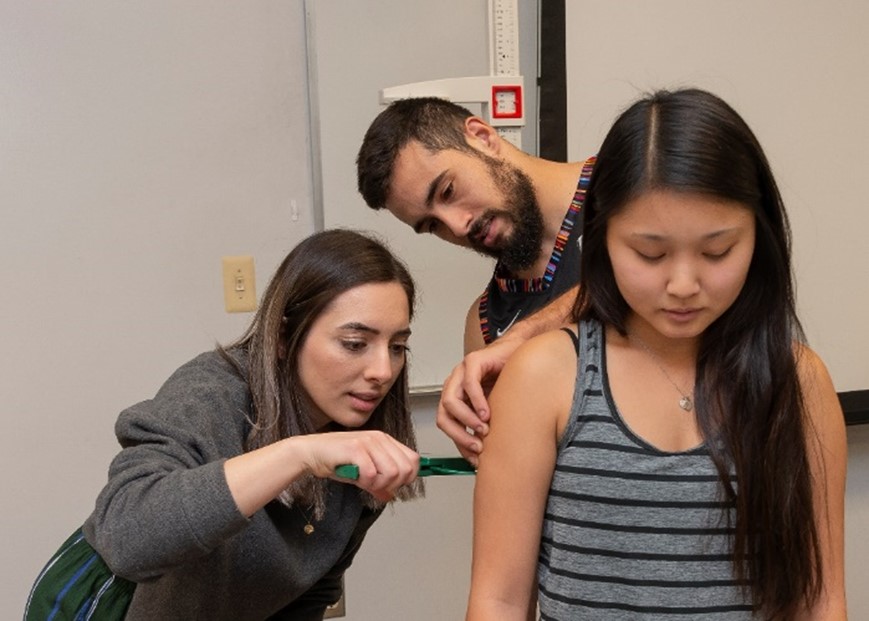Support Page Content
Didactic Program in Dietetics (DPD) Resources
New RDN Requirements
Effective January 1, 2024, the Commission on Dietetic Registration (CDR) will require a minimum of a master’s degree to be eligible to take the credentialing exam to become a registered dietitian nutritionist (RDN). In order to be approved for registration examination eligibility with a bachelor’s degree, an individual must meet all eligibility requirements and be submitted into CDR's Registration Eligibility Processing System (REPS) before 12:00 midnight Central Time, December 31, 2023. For more information about this requirement visit CDR's website.

DPD Forms & Resources
This advising sheet is not intended to replace meeting with a NUFD academic advisor. Please visit the department website and the Didactic Program Dietetics (DPD) website for contact information and availability.
Information Session on Career Opportunities
May 9th Recording (Dietetics Careers)
May 9th Slides (Dietetics Careers)

DPD Handbook
The DPD handbook is designed to assist you in planning your coursework and to answer questions you may have about the educational path to becoming a Registered Dietitian Nutritionist (RDN) or Nutrition and Dietetics Technician, Registered (NDTR). It contains general information about our program such as our Mission Statement and Goals, our accreditation status, how to apply to the Dietetics Concentration, what courses are required for the major, and information about the department and advising. There is also information about our university's policies and procedures that provide guidance in your academic career at Sacramento State.
This handbook is not intended to replace regular appointments with your academic advisor. Rather, it is meant to be a source of information for your use.

Assessment of Prior Learning
 Evaluation Process
Evaluation Process
First-time Sacramento State transfer students are required to attend the mandatory New Student Orientation. The university’s Transfer Credit Evaluations Office conducts an official prior coursework review summarizing previous college credit, including General Education requirements. All applicable work in progress will be evaluated only when the final grades are received. The evaluation results are available in the student’s academic record which can be accessed in MySacState.
Acceptance of Transfer Credit
Generally, students will be granted credit for baccalaureate-level courses successfully completed at regionally accredited two or four-year colleges. All courses, except remedial, are accepted for degree credit from institutions awarding four-year degrees.
Articulation Agreements
For transfer credit agreements, use the following tools in order:
- California public institutions: ASSIST.org
- All other agreements: Transfer Evaluation System (TES)
- If neither ASSIST or TES apply: Submit a Transfer Course Equivalency form with course syllabi. The Transfer Course Equivalency Form is submitted to the department that reviews a specific course. For example, if you completed general biology at another institution, you will submit the course syllabi for evaluation in the Biology Department. The courses must be of the same level; a lower-division course can only be substituted with a lower-division course, and an upper-division course can only be substituted with an upper-division course.
Student Success Resources
Distance Learning Tools and Required Equipment
Tuition, Fees, and Living Expenses
The cost of books and supplies per semester is approximately $ 1,136. Additional charges may apply on a class-by-class basis for items such as laboratory fees ($25 or more) and the purchase of a laboratory coat ($35 or more).
Visit the link below for a description of financial deadlines and registration fees, including tuition, mandatory campus fees, and non-resident tuition fees.
Click the link below for information on living expense estimates including books and supplies, food and housing, transportation, and other miscellaneous personal expenses.
Sac State’s Net Price Calculator provides estimated net price information for the cost of attendance, including tuition and fees, books and supplies, food and housing, and other related expenses. The cost of attendance changes every year.
Financial Aid and Scholarship Services
Financial aid refers to programs such as state grants, federal grants, federal work-study, scholarships, and student and parent loans. These programs are designed in combination to help students cover the costs of education. Information about financial aid can be found by visiting the Student Service Center website below.
Click the links below for applying for financial aid, tutorials and resources on financial aid, information about fee deferment, scholarships, loans, grants, and for peer-to-peer Financial Wellness program.
Federal Work Study (FWS) program helps students earn funds for educational expenses while providing part-time work experience. Visit the FWS program website to know more about the application process and other requirements for participation.
Academy of Nutrition and Dietetics Scholarships: Funds are available for qualified candidates to receive scholarships through the Academy of Nutrition and Dietetics Foundation.
The California Academy of Nutrition and Dietetics Foundation offers scholarships annually to dietetic students and professionals.
International Financial Assistance and Resources Directory is for U.S. and international students and professionals seeking funding for professional study, work experience or research in their home country or abroad. (Made possible by Alice Adelheid Wimpfheimer, MS, RD, CDN, through the Wimpfheimer-Guggenheim Fund for International Exchange in Nutrition, Dietetics and Management.)
DPD Verification Statement
The DPD Director reviews the student's degree progress on a regular basis. Upon successful completion of the degree requirements, including the major and GE/GR, the registrar approves the student for graduation. Once the degree is officially posted in the transcript, the DPD Director will issue the graduate a Verification Statement; the form is completed, signed, and supplied by the DPD Director. The signed Verification Statement documents that an individual has completed the requirements of a nutrition and dietetics education program accredited by the Accreditation Council for Education in Nutrition and Dietetics.